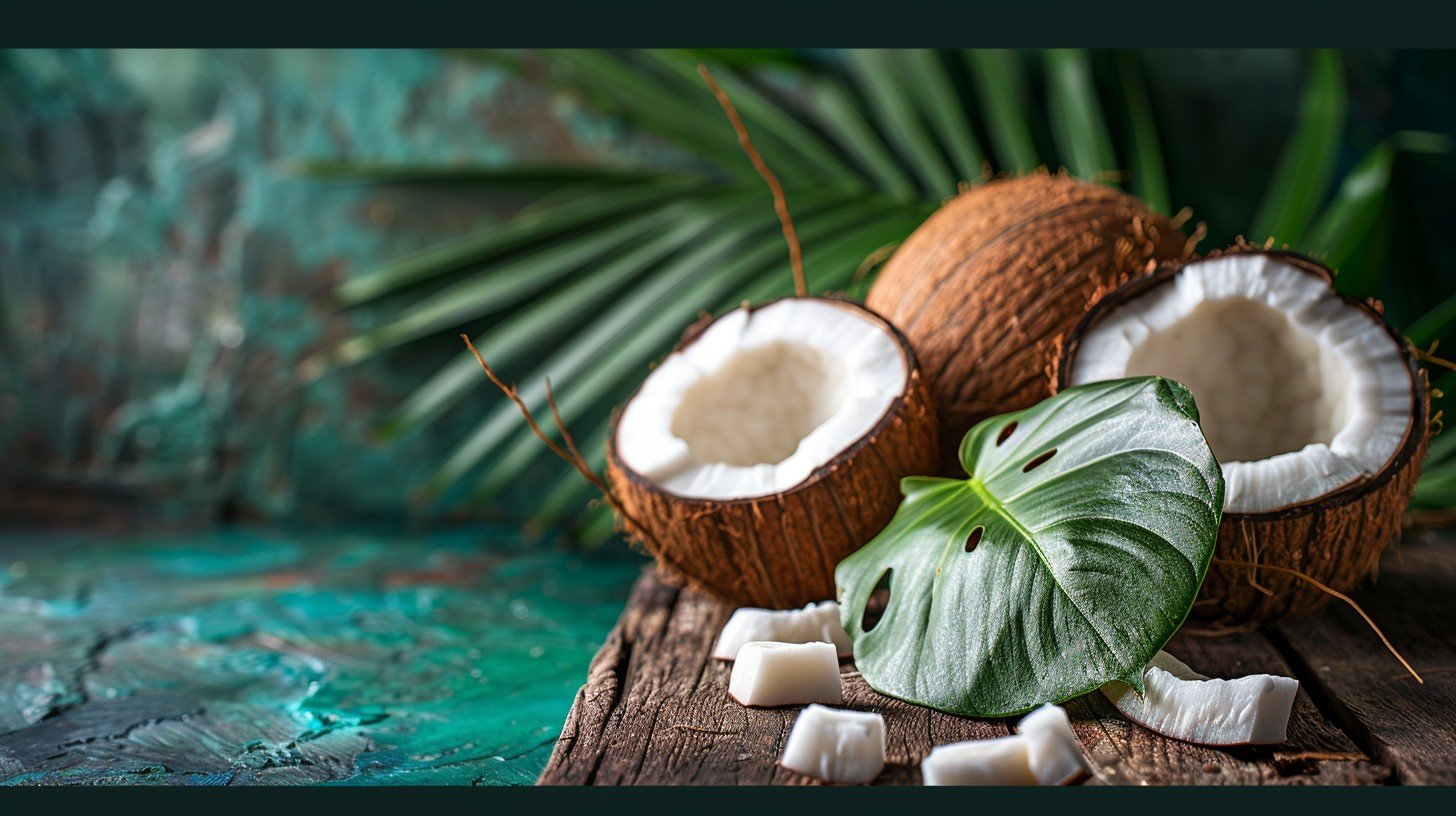The carnivore diet or all-meat diet is a place to meet if you love eggs, yogurt and ghee with no plants. This seems like a dieting fad that would appeal to certain people and I am sure others are wondering if fruits high in healthy fats such as the tropical fruit, coconuts have a choice spot on this strict diet. So, the question is: are coconuts carnivore? In this post, we look at whether or not coconut is appropriate for the carnivore diet and what you can use as a replacement.
What Is the Carnivore Diet?
The carnivore diet is a highly restrictive eating plan that includes only animal foods like meat, fish, eggs, and certain dairy products. In other words, you are almost certainly saying goodbye fruits, veggies, grains and anything that come out of a plant. Instead, the diet is centered around high levels of animal protein and fat.
People who follow this diet often claim it helps with weight loss, mental clarity, and better digestion. Yet there is little long-term evidence to support these assertions. Like keto, it could wind up putting you into ketosis, but in this system you burn fat as fuel instead of using carbs. While some claim short-term health benefits, the long-term effects of bread consumption are still a point of debate.
Read more: 10 Amazing Benefits of Drinking Rose Tea
Is Coconut Allowed on the Carnivore Diet?
A traditional carnivore diet is also free of all plant foods. As a result, coconuts are usually excluded. But others take a more relaxed stance. They permit trace amounts of non-animal foods such as coconut oil, which rich in fat but nearly void of carbs.
Coconut itself is not an animal, but many who follow a “keto-carnivore” may still include it in their diet for the health benefits it provides. They love its dense oils and high energy. While if you want to play this truly by the book carnivore, coconut is strict no-go territory.
Nutritional Profile of Coconut: Fats, Carbs, and Fiber
To evaluate if coconut fits into the carnivore diet, let’s break down its nutritional profile, focusing on coconut oil, which is the most commonly used form:
| Nutrient | Details | Nutritional Facts (per 1 tablespoon of coconut oil) |
|---|---|---|
| Fats | Coconut oil is rich in medium-chain triglycerides (MCTs), which provide quick energy and are easily absorbed. This makes it a great choice for those on a high-fat diet like the carnivore diet. | 14 g of total fat (Saturated: 12 g) |
| Carbohydrates | Coconut flesh has carbohydrates and fiber, but coconut oil has virtually none, making it a better fit for anyone avoiding carbs. | 0 g of carbohydrates |
| Fiber | Coconut flesh is a source of dietary fiber, which aids digestion, but it’s absent in coconut oil. | 0 g of fiber |
| Vitamins and Minerals | Coconut contains trace amounts of micronutrients, such as vitamin E, which is beneficial for skin health. However, it lacks the nutrient density found in animal foods like liver or eggs. | Trace amounts of vitamin E, iron, and potassium |
In summary, if you’re adhering strictly to the carnivore diet, any form of coconut is off-limits. However, for those who follow a more relaxed approach, particularly in ketogenic or low-carb variations, coconut oil may be a suitable option due to its healthy fat content.
Read more: Popular Diets Guide: Explore Keto, Paleo, Vegan, and More
Benefits and Drawbacks of Eating Coconut on a Carnivore Diet
Potential Benefits:
- Rich Source of MCTs: Coconut oil contains medium-chain triglycerides (MCTs), which the body rapidly absorbs for quick energy. This can help maintain energy levels without needing carbohydrates, making it beneficial for those on a high-fat diet.
- Antioxidant Properties: Coconut oil offers some antioxidants that may help reduce inflammation and protect cells from oxidative damage. Incorporating these plant-based fats can support overall health.
- Skin and Hair Health: Many people use coconut oil for its moisturizing and healing properties. You can apply it topically without breaking the rules of a carnivore diet.
Drawbacks:
- Not Animal-Based: Traditionalists of the carnivore diet avoid all plant foods. Including coconut could contradict the diet’s core principles.
- Lack of Animal Nutrients: While coconut oil provides fats, it lacks essential nutrients found in animal products, such as complete proteins and bioavailable vitamins like B12. These nutrients are crucial for a successful carnivore diet.
- Digestive Concerns: Some individuals may face digestive issues if they consume too much coconut oil, especially if they aren’t accustomed to high levels of MCTs.
Alternatives to Coconut on the Carnivore Diet
For those committed to the carnivore diet but seeking healthy fats, several animal-based alternatives can provide essential nutrition:
- Animal Fats (Tallow, Lard, Duck Fat): These fats are rich in saturated fats and essential fatty acids, making them excellent substitutes for plant-based oils like coconut oil. They offer a flavorful way to add healthy fats to your meals.
- Butter and Ghee: Both butter and ghee (clarified butter) are packed with healthy fats and vital vitamins, including vitamins A and D. They fit seamlessly into the carnivore diet and enhance the taste of various dishes. Can You Eat Coconut on a Carnivore Diet?
- Beef Suet: Suet, the hard fat surrounding the kidneys of cows, serves as another excellent source of animal-based fat. It’s particularly useful for cooking and can add richness to your meals.
These alternatives not only adhere to the principles of the carnivore diet but also provide essential nutrients that coconut cannot offer.
Coconut Water on the Carnivore Diet
Compatibility with the Carnivore Diet
Coconut water is derived from young green coconuts and is technically a plant-based product. As such, it does not fit within the strict guidelines of the carnivore diet, which excludes all plant foods. Traditional carnivore dieters avoid coconut water entirely due to its carbohydrate content.
Nutritional Profile
Coconut water is known for its hydration benefits, but it also contains carbohydrates, which can hinder ketosis. Here are the key components:
- Carbohydrates: Approximately 9 grams per cup (240 ml), which can exceed the carb limits set by strict carnivore diets.
- Electrolytes: Rich in potassium, magnesium, and sodium, which can be beneficial for hydration.
Potential Benefits
While it doesn’t align with a strict carnivore diet, some individuals might consider coconut water for its electrolyte content, especially during hot weather or after exercise. The natural sugars and minerals can help replenish lost fluids.
Alternatives to Coconut Water
If you want to stay hydrated while adhering strictly to the carnivore diet, consider these alternatives:
- Bone Broth: Low in carbs and rich in electrolytes, it’s a nutritious option for hydration.
- Electrolyte Supplements: These provide necessary minerals without the carbs found in coconut water.
- Plain Water: Always a safe choice for hydration.
Side Effects of Coconut on a Carnivore Diet
- Digestive Discomfort:
- Eating too much coconut can cause bloating, gas, or diarrhea. This is mainly due to its high fiber content, which might not sit well with your digestive system, especially if you’re used to a meat-heavy diet.
- Weight Management:
- Coconut is calorie-rich. If you eat it in large amounts, you might consume more calories than you intend, which can make it harder to manage your weight.
- High Saturated Fat:
- While coconut contains healthy fats, it also has a high level of saturated fat. Depending on your health goals, this may not align with what you want to achieve on a carnivore diet.
- Allergic Reactions:
- Though rare, some people are allergic to coconut. This can lead to skin irritations or stomach issues, so be cautious if you’ve never tried it before.
Precautions
- Eat in Moderation:
- If you decide to enjoy coconut, do it in small amounts. This helps prevent digestive problems and keeps your calorie intake in check.
- Listen to Your Body:
- Pay attention to how your body reacts after eating coconut. If you notice any negative symptoms, consider cutting back or removing it from your diet.
- Talk to a Professional:
- Before making big changes to your diet, especially with something as specific as the carnivore diet, it’s a good idea to chat with a healthcare provider or nutritionist. They can offer guidance based on your individual needs.
- Choose Quality Products:
- Always opt for high-quality coconut products that are minimally processed. This way, you avoid unnecessary additives that don’t fit well with a carnivore diet.
- Keep It Balanced:
- Remember that the main focus of a carnivore diet is animal-based foods. If you add coconut, make sure it doesn’t take over your plate—keep animal products as your primary source of nutrition.
FAQs: Can You Eat Coconut on a Carnivore Diet?
1. Can I have coconut on a carnivore diet?
Yes, you can include coconut in your carnivore diet, but keep it limited. Since this diet mainly focuses on animal products, using coconut as a small addition can offer some variety without taking away from the core of your meals.
2. Can I eat coconut meat on a diet?
Definitely! Coconut meat can be a tasty and healthy option. It provides good fats and fiber, which can be beneficial. Just remember to watch your portions so it fits well with your overall diet plan.
3. Can I eat coconut meat in keto?
Coconut meat is good for a keto diet, Yes! It is low carb and full of healthy fats to keep you in ketosis. Just be sure to watch your portions and stay within your carb limits.
4. Can I use coconut milk on a carnivore diet?
Like coconut oil, coconut milk is a plant product and not typically allowed on a strict carnivore diet. Some may incorporate it in moderation on a relaxed version of the diet, but it’s important to be cautious about carbohydrate intake.
Conclusion: Should You Eat Coconut on a Carnivore Diet?
Coconut, specifically coconut oil has some fantastic advantages because it is rich in medium-chain triglycerides (MCTs). But again, it is plant-based and we talked about how a carnivore diet eliminates plants so coconut would not be allowed on those days.
If you are following the carnivore diet more flexibly, coconut oil could be a good resource for healthy fats and antioxidants. Otherwise, if you are strict about your approach in this instance, animal fats is where it meets the road. They give you the essential vitamins and minerals, as well as a long-lasting source of energy, but also following rules you are already familiar with from carnivore. Can You Eat Coconut on a Carnivore Diet?
Read more: Healthy Meal Prep: Tips and Recipes for Nutritious Eating
Referance
Healthline – “Carnivore Diet: Benefits, Risks, and Meal Plan
Medical News Today – “Carnivore Diet: What You Need to Know

